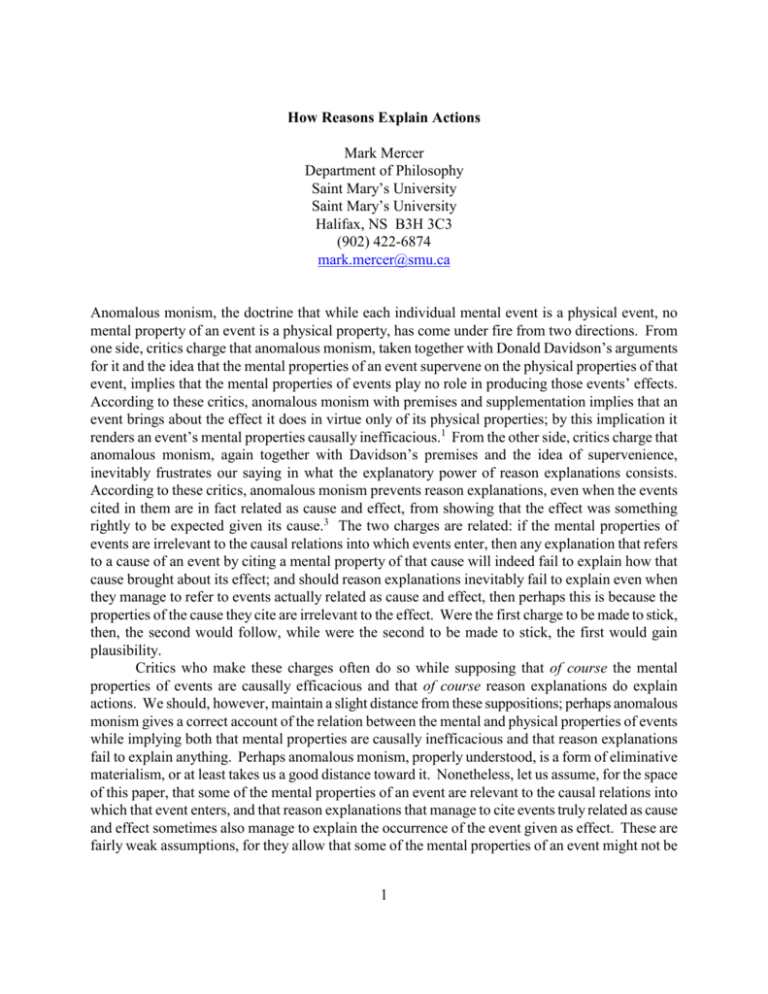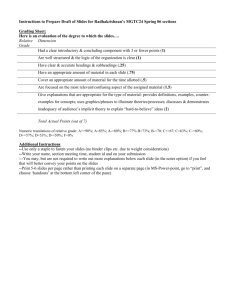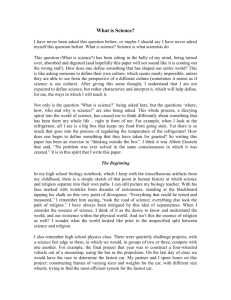How Reasons Explain Actions
advertisement

How Reasons Explain Actions Mark Mercer Department of Philosophy Saint Mary’s University Saint Mary’s University Halifax, NS B3H 3C3 (902) 422-6874 mark.mercer@smu.ca Anomalous monism, the doctrine that while each individual mental event is a physical event, no mental property of an event is a physical property, has come under fire from two directions. From one side, critics charge that anomalous monism, taken together with Donald Davidson’s arguments for it and the idea that the mental properties of an event supervene on the physical properties of that event, implies that the mental properties of events play no role in producing those events’ effects. According to these critics, anomalous monism with premises and supplementation implies that an event brings about the effect it does in virtue only of its physical properties; by this implication it renders an event’s mental properties causally inefficacious.1 From the other side, critics charge that anomalous monism, again together with Davidson’s premises and the idea of supervenience, inevitably frustrates our saying in what the explanatory power of reason explanations consists. According to these critics, anomalous monism prevents reason explanations, even when the events cited in them are in fact related as cause and effect, from showing that the effect was something rightly to be expected given its cause.3 The two charges are related: if the mental properties of events are irrelevant to the causal relations into which events enter, then any explanation that refers to a cause of an event by citing a mental property of that cause will indeed fail to explain how that cause brought about its effect; and should reason explanations inevitably fail to explain even when they manage to refer to events actually related as cause and effect, then perhaps this is because the properties of the cause they cite are irrelevant to the effect. Were the first charge to be made to stick, then, the second would follow, while were the second to be made to stick, the first would gain plausibility. Critics who make these charges often do so while supposing that of course the mental properties of events are causally efficacious and that of course reason explanations do explain actions. We should, however, maintain a slight distance from these suppositions; perhaps anomalous monism gives a correct account of the relation between the mental and physical properties of events while implying both that mental properties are causally inefficacious and that reason explanations fail to explain anything. Perhaps anomalous monism, properly understood, is a form of eliminative materialism, or at least takes us a good distance toward it. Nonetheless, let us assume, for the space of this paper, that some of the mental properties of an event are relevant to the causal relations into which that event enters, and that reason explanations that manage to cite events truly related as cause and effect sometimes also manage to explain the occurrence of the event given as effect. These are fairly weak assumptions, for they allow that some of the mental properties of an event might not be 1 causally efficacious as well as that some true reason explanations might indeed fail to be explanatory. With these assumptions in place, then, we can look to see whether the charges in fact will stick. I propose to deal with the second charge, that anomalous monism implies that reason explanations are not at all explanatoryCor, at best, are extremely poor explanations. A reason explanation is an explanation of an action that explains the occurrence of that action by citing a reason the agent had for performing that action as its cause. “Sam hid his money under his bed because he worried that Margaret might steal it” is an example of a reason explanation; it explains Sam’s action of hiding his money under his bed by citing as its cause a reason Sam had for hiding his money under his bed, specifically, Sam’s worry that Margaret might steal it. Critics are right that anomalous monism implies not only that reason explanations are not covering law or even covering generalization explanations; they are, however, wrong to think that this means that anomalous monism implies that reason explanations must fail to explain the actions they purport to explain. Reason explanations are dispositional explanations, and cannot be reduced to, or understood as a degraded form of, any other sort of explanation. I will show both that reason explanations, as dispositional explanations, are capable of explaining actions and that no part of anomalous monism excludes our understanding reason explanations as dispositional explanations. I The argument Davidson gives for anomalous monism has three premises: 1) some mental events, at least some of those mental events that involve acquiring a propositional attitude, are causes and effects of other events; 3) where two events are related as cause and effect, there is a strict law according to which whenever an event belonging to the type of the cause occurs, an event belonging to the type of the effect will occur; and 3) there are no strict laws on the basis of which effects, when they or their causes are picked out by their mental properties, can be predicted or explained.3 Over the years, Davidson has given a variety of arguments in support of the third premise,4 and recently he has offered some considerations in favour of the second.5 The doctrine supported by these premises, anomalous monism itself, is that every individual mental event that is the cause or effect of another event is identical to a physical eventCthat is, every event that has a mental property and, thus, is a mental event also has a physical property and, thus, is a physical eventCwhile no mental property of an event is one of that event’s physical properties. In other words, while there are no events in addition to physical events that enter into causal relations, no open-ended type of mental event is also a well-behaved type of physical event. Davidson adds to the doctrine of anomalous monism the idea that the mental properties of any event that has mental properties supervene on the physical properties of that event; and they supervene not just on any of its physical properties, but specifically on those that are mentioned in the strict causal laws subsuming that event and its cause and effect.6 This supplementation is meant to capture the idea that even though mental facts about causes and effects are not physical facts, the physical facts of the world of cause and effect determine all the mental facts. Nothing changes among mental properties without at the same time something changing among physical properties. We might best understand just what the arguments, the doctrine, and its supplementation together amount to by looking at a particular case of two events related as cause and effect. Sally comes to believe that Étienne will be annoyed should she keep his book another day, and when this 2 belief comes together with her desire not to annoy Étienne, she acquires a reason to return Étienne’s book today. Her acquiring this reason causes her returning today of the book to Étienne. The event of Sally’s acquiring a reason to return Étienne’s book is a mental event, since, as composed of the belief that Étienne will be annoyed should his book not be returned today and the desire not to annoy Étienne, it bears a mentalistic description. Nonetheless, according to anomalous monism together with Davidson’s premises and the supervenience thesis, the following three things are true about this mental event. First, its property of being the acquiring of a specific reason to return Étienne’s book is not any physical property under a mentalistic descriptionCthe type to which belong all acquirings of that reason to return Étienne’s book is not lawfully coextensive with any type described in physicalistic terms. Second, this mental event is also a physical event, bearing some physicalistic description. The argument to this conclusion is as follows: Since this mental event caused Sally’s returning of Étienne’s book, it must be covered by a strict law; but, since no strict law contains mentalistic terms, in order for that mental event to be covered by a strict law it must have a physicalistic description. That it has a physicalistic description means that it is a physical event. Third, its property of being the acquiring of a specific reason to return Étienne’s book, though a mental property, supervenes on a set of its physical properties. Were this event to lose this mental property, it would at that moment either lose or gain a physical property, one, moreover, cited in a strict causal law covering this event and its cause or effect. The event of Sally’s acquiring this reason is the cause of the event of Sally’s returning the book. What, then, would an explanation of this effect, of Sally’s returning the book, look like? The obvious answer is that it would look like this: Sally returned to Étienne his book today because she thought that were she to fail to return it to him today, Étienne would be annoyed, and she didn’t want Étienne to be annoyed. Her action, that is, when described as an action, is explained by citing its cause, the latter described as her reason for performing that action. II What is it that inclines critics to think that anomalous monism implies that this reason explanation for Sally’s action must lack explanatory force? To answer this question, we need to look at explanations generally and reason explanations in particular. The concept of explanation is closely tied to the concepts of prediction and control. Nothing explains the occurrence of an event that would not have given us some reason to have expected that that event would occur; unless it would have given us a reason to think that that event was at least a little more likely to occur than not, it cannot count as an explanation of that event. Further, nothing explains the occurrence of an event that leaves us ignorant of how, if only in theory, to manipulate the course of events so as to prevent or to bring about events of that type. The more likely the explained event was to occur given the explanation, and the greater our ability to use the explanation in preventing or bringing about events of that type, the better the explanation is. Certainly, then, covering law explanations are the very best sort of explanations. An explanation of an event that contains both a strict law to the effect that whenever an event of some particular sort occurs, an event of the sort to which the event to be explained belongs will occur, and a statement that an event of the first sort had occurred, is as good an explanation of that event as is possible. Knowing the law and that an event of the type described in the antecedent has occurred would suffice to enable us to conclude that an event of the type described in the consequent will occur. Armed with the law, we 3 have, at least in theory, the ability both to bring about the effect and to decrease the chance of its occurrence. However, few, if any, of our ordinary explanations are covering law explanations; few of us know many strict laws. We do, though, know many empirical generalizations. Often enough, glass windows struck by heavy rigid objects will shatter; early autumn frosts kill unprotected flowers; when the gas pedal is depressed, the car accelerates. The fact that a particular glass window shattered is explained well enough by noting the generalization relating glass-shatterings to strikings by heavy rigid objects and that a brick, a heavy rigid object, struck that particular window. In the absence of knowledge of strict laws, empirical generalizations, even when hedged by “often”s and “usually”s and ceteris paribus clauses, serve very well in explanations. We can think of empirical generalizations as ranged on a scale, from the almost empty at one end to the strictest of laws at the other. “Ice becomes liquid water when the temperature gets high enough” is not quite empty; “pure water under the pressure of one atmosphere boils when raised to 100 degrees Celsius” is close to being a strict law. The closer a generalization is to being a strict law, the better the explanation that includes it, but so long as the generalization has some empirical content, any explanation using it will go some way towards explaining what happened. This means, then, that even if Davidson is right that nothing containing a mentalistic term can be a strict law, still, so long as we have empirically significant generalizations relating types of reasons to types of actions, we can fashion acceptable explanations of actions by citing the reasons that caused them. Reason explanations, when expanded into covering generalization explanations, would sustain ties to prediction and control just as other empirical explanations do. Covering law explanations might be the very best explanations, but covering generalization explanations, as degraded covering law explanations, can still possess explanatory force. Anomalous monism faces two difficulties here. First, one of Davidson’s arguments for the claim that there are no strict laws on the basis of which events, when described as mental, can be predicted or explained, seems to rule out the possibility of relating types of reasons to types of actions even through less-than-strict empirical generalizations. Second, because one of the premises from which Davidson argues to anomalous monism is that where there is causality there is strict law, any action explained in a reason explanation could also be explained in a covering law explanation (were we to know the covering law, of course). Critics think that these two difficulties preclude anomalous monism from allowing that reason explanations possess explanatory force. The specific argument that rules out useful empirical generalizations relating reasons to actions is this: For an empirical generalization to be a strict law, it must be regularly possible for one to know that an event of the sort described in the antecedent has occurred without knowing whether an event of the sort described in the consequent has occurred. Only that way is a generalization potentially falsifiable or confirmed by positive instances. The way in which events are described in generalizations linking reasons with actions, however, renders impossible our telling whether the antecedent conditions are fulfilled before we note the kind of action the agent performs. No doubt it is true that people who want most of all to sip tea and believe themselves able to sip tea will intentionally do something that can described as sipping tea (or attempting to sip tea), if they do anything at all intentionally; nonetheless, that someone wants most of all to sip tea and believes herself able to do so is most readily confirmed by her intentionally sipping tea. That the generalization relating sipping tea to wanting to sip tea is no doubt true has more to do with its whiff 4 of tautology than with any status it might have as a piece of well-confirmed empirical lore. It is, of course, often the case that one has good reason, prior to noting that someone is sipping tea, for thinking that that person wants more than anything to sip tea; yet that person’s failure to sip tea would not disconfirm the generalization, but instead tell against the idea that one has correctly identified her state of mind. Thus, Davidson concludes, we have reason for thinking that generalizations that relate types of reasons to types of actions cannot aspire to the condition of strict law.7 But this argument against the possibility of strict laws relating types of reasons to types of actions, if it goes through, seems to tell also against the possibility of any sort of empirically significant generalizations relating reasons to actions. A generalization lends force to an explanation only to the extent to which that generalization possesses real empirical content. Consider the claim that the window shattered because a brick struck it. This claim suggests the generalization that heavy enough bricks travelling fast enough will shatter windows of roughly the same construction as this one. Now certainly this generalization lends less force to the explanation of the shattering than would a generalization in which the weight and speed of the brick are specified without recourse to the type of effect to be expected. Still, this generalization does have empirical significance, and it seems in principle to lend itself to further sharpening. On the other hand, if Davidson’s argument is cogent, then the sorts of generalizations got from reason explanations that would play an analogous role in expanded explanations must inevitably be extremely low in empirical content, and not susceptible to further improvement. Consider again that Sally returned Étienne’s book because she didn’t want Étienne to become annoyed and believed he would become annoyed were she to fail to return it. This explanation suggests the generalization that people who don’t want to annoy others and believe keeping a book will annoy another tend to return that book. Not only is this not a strict law, though, it is poor even as an empirical generalization. If Davidson is right that it is close to a tautology, then an explanation of Sally’s action in which it figures is going to be no better than the simple reason explanation for that action. So Davidson’s critics appear to be right that anomalous monism, together with one of Davidson’s arguments for a thesis of it, implies that reason explanations are not ersatz or degraded covering generalization explanations and, thus, do not take whatever explanatory force they have from related covering generalization explanations. Here the second difficulty mentioned above comes into play. If Davidson is right that where there is causality there is strict law, then any event for which there is a reason explanation is an event potentially explicable through a covering law explanation. This means, though, that any event for which there is a reason explanation is an event for which a better explanation exists. Moreover, because the reason explanation is not a degraded version of this better explanation, because it doesn’t stand to this explanation as the covering generalization explanation of the shattering of the window stands to the covering law explanation of that event, whatever explanatory force it has does not accrue to it in virtue of that covering law explanation. So for each reason explanation of an action there is a better explanation of that action, a better explanation to which the reason explanation is conceptually unrelated. Now if one subscribes to the principle that for any event there is at most one complete explanation, then, if one accepts Davidson’s argument, one must conclude that reason explanations are in a bad state indeed.8 Given this principle, that reason explanations are unrelated to better covering law explanations implies that they are in fact excluded by those explanations. 5 III Davidson’s argument that there are no strict laws relating types of reasons to types of actions, if cogent, shows also that there are no empirically significant though less-than-strict generalizations relating types of reasons to types of actions. This, in turn, means that reason explanations cannot be expanded into covering generalization explanations. Whatever explanatory force reason explanations have, then, this force does not come to them from covering generalizations. Some of Davidson’s critics seem to think that for any explanation, either that explanation potentially contains a covering generalization, whether strict law or not, or it is without explanatory force.9 Others hold only that Davidson himself is committed to this view.10 Either way, they conclude, Davidson’s views deprive reason explanations of explanatory force. But, of course, to note that on anomalous monism reason explanations are not covered by generalizations isn’t immediately to say that according to anomalous monism reason explanations must lack explanatory force. Davidson’s critics tend to overlook the possibility that some forms of causal explanation derive their explanatory force from some source other than implicit covering generalizations. Still, to note this does make pressing the question how else can reason explanations succeed in explaining actions? The most promising idea as to how reason explanations work to explain actions is, I think, that they explain actions by citing dispositions of their causes. Consider, first of all, an dispositional explanation of an everyday event. The skin on Marie’s face, having been dried and roughened by a trek to the store on a January afternoon in Winnipeg, regained its softness. The cause of its regaining its softness was Marie’s applying an emollient to it. One obvious explanation of the event of Marie’s skin regaining its softness would, then, be this: Her skin regained its softness because she applied an emollient to it. Now if we try to expand this into a covering generalization explanation, we will be disappointed. The generalization this explanation suggests is something like this: applying an emollient to rough skin tends to soften it. But this generalization, we must agree, hardly counts as an empirical insight into the ways of the world. We are disappointed in our search for a covering generalization explanation because the handy generalization that fits our descriptions of the cause and effect is without significant empirical content. Nonetheless, the original dispositional explanation, that Marie’s skin regained its softness because she applied an emollient to it, is itself far from empirically empty. The knowledge that she applied an emollient would have led us to expect that her roughened skin would be softened; and we know that had we prevented her from applying it, we would have increased the probability of her skin remaining rough. From this explanation we can fashion many interesting conditional predictions, such as that if the emollient were applied to Marie’s or anyone’s sun-dried, rather than cold-dried skin, it would likely soften it as well. This explanation tells us a lot about what to expect of the substance Marie put on her skin. The dispositional explanation explainsCit fosters prediction and controlCwithout being expandable into a covering law explanation. Reason explanations seem to explain in the same way. That Sally thought that not returning Étienne’s book would annoy Étienne and that she wanted Étienne not to be annoyed explains why Sally returned Étienne’s book, because to cite this reason is to cite a complex disposition Sally has. Knowing that she had this reason would have enabled us, at least in theory, to have prevented her returning the book; we could have intervened to cause her to lose either her belief that Étienne would 6 be annoyed or her desire that Étienne not be annoyed. Moreover, we can use knowledge of this reason to fashion many conditional predictions about Sally’s behaviour at that time. For instance, had Sally believed that smirking at Étienne would annoy him, it is likely that she would intentionally have refrained from smirking at him. Or, had she wanted to annoy him, it is likely that she would have kept the book a day or two longer. Davidson makes the point this way. Though knowing Sally’s reason for acting as she did tells us little about agents generally, for the generalization it suggests is the nearly tautological claim that people who want not to annoy another avoid doing those things they believe will annoy that other, it tells us a lot about Sally herself, about what we could expect from her at that moment, both as the moment in fact stands and as it would have stood had it differed in particular respects.11 This is why reason explanations are no worse, as explanations, than are other dispositional explanations. Though adverting to the dispositional properties of a substance, such as its solubility, inflammability, or emollience, tells us nothing about substances generally, beyond such nearly tautological claims as that if they are emollients they soften rough skin, doing so tells us much about what to expect about that particular substance itself, about what is likely to happen were this or that event involving the substance to occur, thus affording us prediction and control regarding that particular substance. IV Two further points need to be made in connection with the idea that reason explanations are a form of dispositional explanation and, thus, have the explanatory force of dispositional explanations. The first is that while any reason explanation that truly relates reason to action as cause to effect is, to that extent, as good as any other reason explanation that also does so, reason explanations seem to vary in quality. What accounts for their seeming to vary in quality is the quantity and relevance of our background knowledge case to case. That Sally was concerned not to annoy Étienne and so returned his book todayCeven though she was not finished with it and would have liked to have used it to prepare for tomorrow’s examinationCis a particularly informative explanation given our awareness that Sally is generally not one to annoy others, even inadvertently, if she can help it, and that she has developed an especial fondness for Étienne and is loath to jeopardize their friendship. This is a fine reason explanation because it fits so well with so many of our other ideas about Sally. Were we not to have all these other ideas, though, or were an explanation, though true, not to connect up with our other ideas so well, then, despite our having an adequate explanation, we would continue to be puzzled in many ways about what happened and why. Until we became better apprised of Sally’s attitudes and habits, we would fail to find the reason explanation for her behaviour satisfying. Nonetheless, it is a mistake to think that a reason explanation we happen to find unsatisfying must therefore be less than explanatory, that it must lack the explanatory force that reason explanations that satisfy us possess. The fault, the cause of our dissatisfaction, might lie not with the explanation itself, but with our inability to place it among other explanations and things we know. Each individual reason explanation suffers, in comparison with covering generalization explanations, from what Davidson has called the Molière factor, the fact that in dispositional explanations the description of the effect bears a strong conceptual relation to the description of the cause.13 It should be noted that even the worst sufferer of this disease isn’t totally debilitated by it; even to say that the milk soured because something occurred that soured it isn’t to say nothing explanatory at all, for this claim, if true, at least tells us that the milk’s souring wasn’t uncaused. 7 Still, the Molière factor does make for less than satisfying explanations when each dispositional explanation is taken in isolation. But a reason explanation considered not in isolation but rather in the midst of many well-founded attributions of attitudes and beliefs, and attributions of habits and patterns of emotional reaction, can constitute an instance of deep insight. The second point that needs to be made here is that the nature of the explanatory force of an explanation and the evidence we have for thinking that things were in fact arranged as the explanation says they were are two different matters. That Sally did actually intentionally return Étienne’s book today, that she wanted not to annoy him and believed keeping his book would annoy him, and that that is the reason for her returning the book, the cause of her returning it to himCall this must be true for the reason explanation potentially to explain what happened. The evidence that these things are true is part of the totality of our understanding of Sally, a totality that includes the explanation itself. Our justification for attributing these beliefs and desires to Sally need not involve our showing that events picked out by these attributions fall into nomically significant classes.13 V Is this the end of the matter, thenCreason explanations are a form of dispositional explanation and, as such, have the same virtues and limitations as dispositional explanations generally? Not entirely. According to anomalous monism, reason explanations are not reducible to covering generalization explanations, but it is not clear that all physical dispositional explanations are similarly not reducible to covering generalization explanations. Perhaps to be truly explanatory, a dispositional explanation must be a candidate for reduction. Moreover, if the mental properties of events supervene on the nomologically significant properties of those events, then, one might think, what really explains the effects of events with mental properties are those events’ physical properties. Reason explanations of events, being unrelated to the covering law explanations of those events, are, thus, given the principle of explanatory exclusion mentioned in Section II, excluded by those explanations. One body of description, explanation and theory is reducible to another when there are systematic ways of capturing in the terms of the second body the truths statable using the terms of the first body. That a body of lore is reducible to anotherCto another superior to it in that, say, the predictions it licences are more preciseClends that body a sort of respectability; it is at least a weak version of a good theory. Those dispositional explanations within bodies of lore reducible to good structural theories would, thus, bask in the glow of respectability cast by the reducing structural theory. For instance, an explanation of an event that cites the dispositional property of being inflammable, were it reducible to an explanation in a structural theory of combustion, would be underwritten by an explanation not tainted by the Molière factor. But if Davidson is right that reason explanations are not reducible to covering generalization explanations, then it must be true that reason explanations lack epistemic ties to untainted explanations. Dispositional explanations, including reason explanations, afford us prediction and control of events. It is difficult to know why, in addition to whether they afford us prediction and control, issues having to do with their reducibility to other sorts of explanation are relevant to the question of their explanatory force. It would seem to be enough that an explanation affords us prediction and control. In any case, though, while it is true that reason explanations are not reducible to other explanations, there are also good reasons for thinking that they are ineliminable from our thought and talk. At this point we need to say something to justify our early assumption that reason explanations 8 do in fact occasionally explain events, and that the only issue is how they manage to do so. We could, if only in principle, exchange our lore concerning inflammability for a powerful new theory of combustion, and never again explain an occurrence by adverting to the inflammability of a substance. Is there an argument to show that we could not similarly make do without folk psychology, the body of lore within which reason explanations move? One such argument is this: To understand a sentence is to understand its truth conditions, but the concept of a sentence being true cannot be understood apart from understanding the concept of holding a sentence true, and this is the concept of belief, a central folk psychological concept. Any physicalistic dispositional explanation, it might well turn out, either is reducible to another explanationCand, thereby, is only derivatively explanatoryCor is eliminable from our thought and talk; however, if this argument (or some other) for the ineliminability of folk psychology succeeds, then reason explanations differ from physicalistic dispositional explanations in being neither reducible to nor eliminable in favour of other explanations. If they are neither reducible nor eliminable, we have no choice but to think of their explanatory force as residing not in their relations to other explanations, but only in the fact that they pay their own way.14 The objection that because there exist, if only in principle, covering law explanations for the events reason explanations explain, reason explanations must fall prey to the principle of explanatory exclusion, can be dismissed on the basis that it rests on an equivocation. The rational properties of events supervene on physical properties of those eventsCon, specifically, those physical properties cited in strict laws. When we give a reason explanation for an action, we are explaining the very same occurrence, the same event, as we explain when we give a physicalistic explanation. That neurons fired in Sally’s head in some specific pattern explains the very same event, her returning the book to Étienne, that the reason explanation explains. In one sense, then, the two explanations have the same explanadum, the effect in question, and they explain it in the same way, by citing its cause. Nonetheless, there is a sense in which the two explanations do not share an explanadum. Each explains the occurrence, but each explains it under a different description. The reason explanation explains why an event occurred bearing the description “Sally’s intentional returning of the book to Étienne,” and this is something that can be explained only by a description of the cause of that effect under which that cause is revealed to be a reason for returning his book to Étienne. Since no physicalistic description can reveal an event to be the having of a reason for acting, no physicalistic description of Sally’s having this reason could explain the occurrence of the event of her returning the book to Étienne, under that description. We cannot exclude the reason explanation without rendering ourselves unable to explain why the sentence “Sally intentionally returned Étienne’s book to him” truly describes what occurred. Perhaps the principle of explanatory exclusion can be defended in cases in which two or more explanations are on offer for one effect under one description; but the principle gains no purchase when applied to explanations in which the effect is described in fundamentally different ways, even when it is one and the same effect that is picked out by these different descriptions. An event is an action if there is a true description of it that reveals it to be intentionalCif, that is, there is a description of its cause that shows that cause to be a reason for performing that action. Where there is one description of a cause that shows it to be a specific reason, though, there is bound to be a number of other descriptions each showing it to be a reason. We have many reasons for doing each thing we do. Sally wanted not to annoy Étienne; she also wanted to use his book to 9 prepare for tomorrow’s exam. That she wanted to use the book to prepare for tomorrow’s exam explains why she returned the book at the moment that she did, rather than at some time earlier. Each description of Sally’s action under which it is revealed to be intentional will have its own reason explanation. The physicalistic covering law explanation of this event excludes none of these reason explanations, even as each rational property of the cause supervenes on a nomologically significant property of the cause. VI There are two sources of the idea that anomalous monism, together with arguments for it and the thesis that the mental properties of events supervene on the physical properties of those events, implies that reason explanations lack explanatory force. The first is an overemphasis on the covering law model of explanation, an overemphasis that results in the assumption that only those causal explanations covered by laws or generalizations possess explanatory force. The existence of dispositional causal explanations shows that explanatory force can be had without covering generalizations. In fact, though, reason explanations might actually be in better shape than many other dispositional explanations. We might agree that those dispositional explanations reducible to covering generalization explanations draw their force from those covering generalization explanations, while those not reducible but eliminable in favour of other explanations are bereft of explanatory forceCthough, as I’ve said, since what ultimately makes an explanation good is that it affords us prediction and control, it is difficult to know why we should agree with this. But reason explanations are not only irreducible to covering generalization explanations; they might also be ineliminable from our thought and talk. Thus, it cannot but be enough that, as dispositional explanations, they facilitate prediction and control for their credentials as explanations to shine. The second source of the idea that reason explanations lack explanatory force is the inference from the claim that the physical facts of the world of cause and effect determine all the facts of the world of cause and effect to the conclusion that the physical facts explain all the facts. This inference, though, is faulty. What any particular explanation explains is not the occurrence of an event under all descriptions, but only under one. Thus, even though there are physicalistic covering law explanations for each event, to explain why an event bears a description that reveals it to be an action one must recur to a description of its cause that reveals that cause to be a reasonCa reason, moreover, bearing appropriate conceptual relations to that description of the effect. Reason explanations, I have tried to show, are dispositional causal explanations possessed of all the explanatory force of everyday physicalistic dispositional explanations; and I hope I have given sufficient reason to think that the claim that reason explanations are dispositional explanations is entirely consistent with the doctrine, arguments, and supplementation of anomalous monism.15 10 Endnotes 1. Davidson responds to this charge in “Thinking Causes,” Mental Causation, John Heil and Alfred Mele, eds. (Oxford: Oxford University Press, 1995). 3. This charge is made by Louise Antony, “Anomalous Monism and the Problem of Explanatory Force,” Philosophical Review, Vol. XCVIII, No. 3 (April 1989), pp. 153-187, and Robert Murray, “Is Davidson’s Theory of Action Consistent?”, Canadian Journal of Philosophy, Vol. 35, No. 3 (September 1995), pp. 317-334. 3. Donald Davidson, “Mental Events,” Essays on Actions and Events (Oxford: Oxford University Press, 1980). 4. Donald Davidson, “Mental Events” (Sections II and III), “Psychology as Philosophy,” and “The Material Mind,” all found in Essays on Actions and Events. 5. Donald Davidson, “Laws and Cause,” Dialectica, Vol. 49, No. 3-4 (1995), pp. 363-379. 6. “Mental Events,” p. 314; AThinking Causes,” pp. 4-5. 7. This argument against the possibility of strict empirical psychological laws is given in Donald Davidson, “Freedom to Act,” Essays on Actions and Events, pp. 76-77. 8. This principle is defended by Jaegwon Kim, “Mechanism, purpose, and explanatory exclusion,” Supervenience and Mind: Selected Philosophical Essays (Cambridge: Cambridge University Press, 1993). I criticise this principle in Section V below. 9. This seems to be Louise Antony’s view. On pp. 164-165 of “Anomalous Monism and the Problem of Explanatory Force,” Antony formulates as a possible condition for causal explanations what she calls “the nomic constraint,” which constrains explanations to deal with events described as belonging to nomically significant types. 10. In “Is Davidson’s Theory of Action Consistent?”, Robert Murray is primarily concerned with whether Davidson, in saying that reason explanations are ordinary causal explanations, commits himself to the view that they must show cause and effect to fit what Murray calls a “nomic nexus” (p. 330). Nonetheless, on p. 336, Murray himself endorses the view that they must when he writes, “I argue here that to be an explanation a true singular causal statement must fit cause and effect into a nomic nexus.” 11. Donald Davidson, “Hempel on Explaining Actions,” Essays on Actions and Events, pp. 373-375. 11 13. “‘A juleep soporific, narcotic and somniferous.’ What was that for? ‘To induce deep sleep.’” From The Imaginary Invalid, Act I, scene i, English adaptation by Miles Malleson, Samuel French Ltd., 1959. 13. Louise Antony holds that one reason there must be generalizations to cover events cited in singular causal statements, generalizations that pick up on the way in which events are described in those statements, is that otherwise we would have no justification for our singular causal statements (p. 164). But Antony is mistaken, for our attributions of attitudes to agents can be justified on holistic grounds. 14. See Donald Davidson, “Reply to Solomon,” Essays on Actions and Events, pp. 343-344. 15. I thank Sophie Beaulé, David Checkland, Stephen Haller, and Catherine Talmage for criticism and advice. 12






